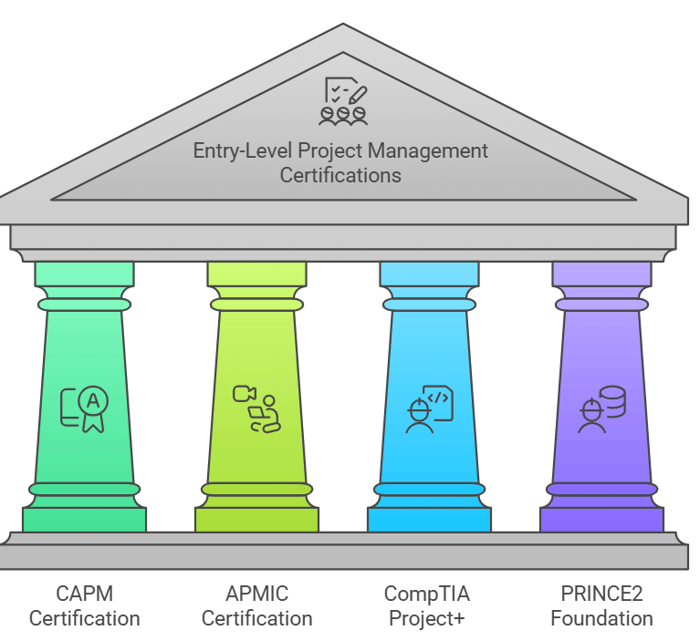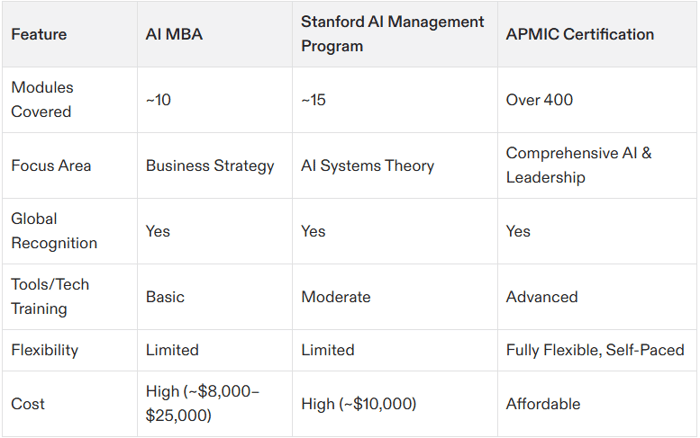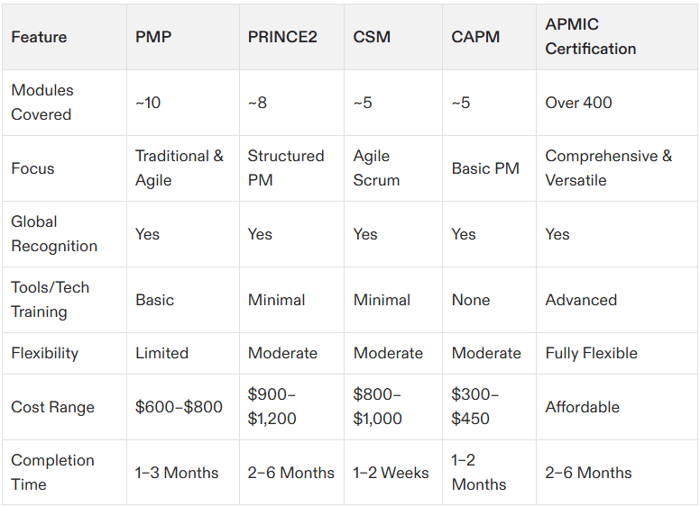Table of Contents
- What is an Entry-Level Project Management Certification?
- Why Get an Entry-Level Project Management Certification in 2025?
- PMP (Project Management Professional) – The Gold Standard
- PRINCE2 – The European Standard
- Best Entry-Level Project Management Certifications in 2025
- How to Get Certified: A Step-by-Step Guide
- Lesser-Known Facts About Project Management Certification
- Where to Find the Best PMP Certification Prep Course
- Final Thoughts: Start Your Project Management Career Today!
- FAQs
So you are interested in project management, then? Good call! If you have ever been the ‘go to’ person to coordinate a group trip, finish a school project or manage the chores in the office without being called a manager, you are a project manager in the making; you just didn’t know it yet. But let’s face it: Today, the job market is tougher than ever. Companies no longer seek individuals who can “manage events” but rather individuals who can demonstrate a knowledge of budgets, risk analysis, scheduling, stakeholders, and Agile methods.
This is why obtaining an entry-level project management certification is one of the best decisions you can make in 2025. It not only makes you different from other applicants but also increases your salary, provides more job options and leads to a promising career as a project manager. But with so many certifications out there, how does one even begin to select the right one? This is where this guide comes in.
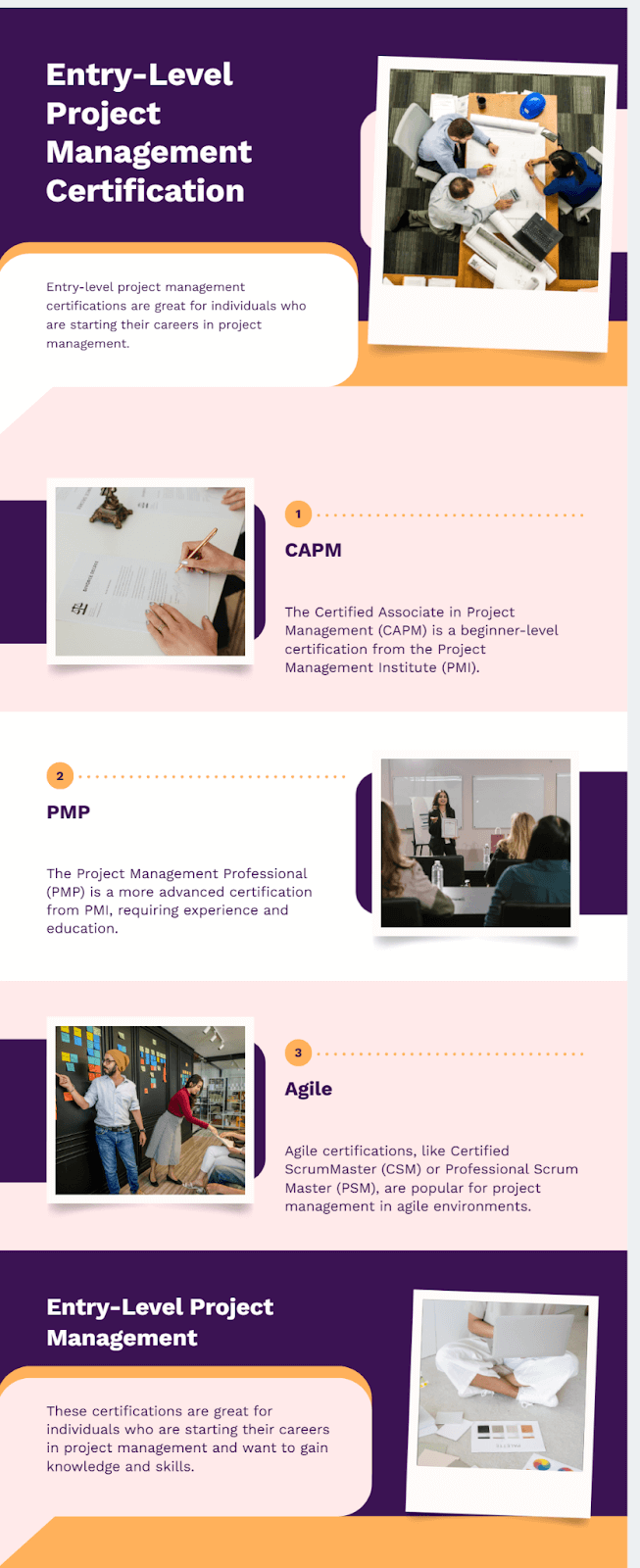
What is an Entry-Level Project Management Certification?
An entry-level project management certification is a credential designed for beginners who want to break into project management without needing years of experience. It provides foundational knowledge about:
Project lifecycles (from planning to execution)
Budgeting and scheduling
Risk management and mitigation
Team collaboration and leadership
Agile and Waterfall methodologies
These certifications serve as a launchpad for anyone looking to start a career in project management. Whether you're transitioning from another career, fresh out of college, or looking to formalize your project experience, getting certified sets you apart from the competition.
💡 Fun Fact: Did you know that project management principles date back thousands of years? The Great Wall of China, which took over 2,000 years to complete, involved some of the earliest project management techniques, such as resource allocation, task delegation, and risk management.
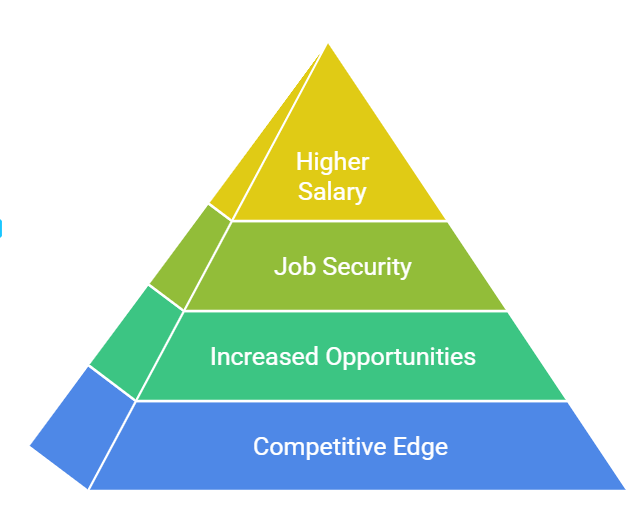
Why Get an Entry-Level Project Management Certification in 2025?
If you're on the fence about getting certified, here are some compelling reasons why it’s worth it:
1. Higher Salary Potential
According to the Project Management Institute (PMI) Salary Report, certified project managers earn 22% more than non-certified professionals. The average salary for an entry-level project manager is $65,000–$85,000, while experienced managers can earn over $120,000 per year.
2. Job Security and Career Growth
Project management skills are highly transferable across industries. Whether it’s IT, healthcare, finance, marketing, or construction, companies are looking for certified professionals who can handle projects efficiently.
3. Increased Job Opportunities
By 2027, the global economy will need 87.7 million project management professionals, according to PMI’s Job Growth Report. This means more job openings and higher demand for certified candidates.
4. Competitive Edge Over Other Job Seekers
Most recruiters use Applicant Tracking Systems (ATS) to filter resumes. Having a project management certification helps you pass the ATS filters and get noticed by hiring managers.
5. A Gateway to More Advanced Certifications
Once you get your first certification, it becomes easier to transition into advanced credentials, such as:
PMP (Project Management Professional) – The Gold Standard
The Project Management Professional (PMP) certification, offered by the Project Management Institute (PMI), is considered the most prestigious and globally recognized project management credential. It is designed for professionals who already have experience managing projects and are looking to demonstrate expertise at an advanced level.
Why Pursue the PMP?
Higher Salary Potential – PMP-certified professionals earn 25% more than their non-certified counterparts (source: PMI Salary Report).
Industry Recognition – Many companies require PMP certification for senior project management roles.
Advanced Knowledge – Covers complex project methodologies, leadership skills, and risk management.
Global Opportunities – Recognized in every industry worldwide.
Eligibility Requirements:
At least 36 months of project management experience
A CAPM certification or a four-year degree
35 hours of project management training or an equivalent PMP prep course
For those who have completed an entry-level project management certification, transitioning to the PMP becomes much easier, as many of the foundational concepts are already covered in beginner courses.
Where to Prepare?
➡ PMP Certification Prep Course – APMIC (Best for structured, interactive learning)
Agile Certifications (Scrum Master, SAFe, PMI-ACP, etc.)
In today's fast-paced work environment, Agile project management has become the preferred methodology for managing projects in industries like software development, IT, marketing, and finance. Agile is iterative, flexible, and highly efficient, making Agile certifications a valuable asset.
Popular Agile Certifications:
Certified Scrum Master (CSM) – Ideal for those who want to specialize in Scrum frameworks.
SAFe Agilist (Scaled Agile Framework – SAFe) – Best for managing enterprise-level Agile transformations.
PMI-ACP (Agile Certified Practitioner) – A globally recognized Agile certification offered by PMI.
Why Get an Agile Certification?
High demand for Agile project managers (Over 70% of organizations use Agile)
Applicable across multiple industries (not just IT)
Great career transition from traditional project management
Many entry-level project managers choose to earn an Agile certification after their first credential to expand their job opportunities and align with industry trends.
PRINCE2 – The European Standard
PRINCE2 (Projects IN Controlled Environments) is one of the most widely used project management methodologies in Europe, Australia, and the UK. Unlike PMP, which is more framework-oriented, PRINCE2 focuses on structured processes and documentation.
Why Choose PRINCE2?
✔ Best for those working in government or European organizations
✔ Focuses on risk management and quality control
✔ Highly structured methodology that ensures project success
Certification Levels:
PRINCE2 Foundation (Entry-Level)
PRINCE2 Practitioner (Advanced Level)
Professionals often start with CAPM, APMIC, or another beginner certification and then pursue PRINCE2 Foundation before moving to PRINCE2 Practitioner.
Best Entry-Level Project Management Certifications in 2025
1. Certified Associate in Project Management (CAPM) – PMI
Best For: Beginners who want a globally recognized certification
Exam Fee: $300 (PMI members get discounts)
Duration: 3-hour exam (150 questions)
2. APMIC Entry-Level Certification – APMIC
Best For: Those who want personalized learning with hands-on experience
Key Benefits:
400+ interactive modules
Covers both Agile & traditional project management frameworks
Flexible learning options
3. CompTIA Project+ – CompTIA
Best For: IT and tech professionals looking to expand their skill set
Exam Fee: $348
Key Topics: Agile, Waterfall, risk management, and communication
4. PRINCE2 Foundation – AXELOS
Best For: People interested in working in the UK or Europe
Exam Fee: $550
Focus: Standardized project management processes
How to Get Certified: A Step-by-Step Guide
To get your entry level project management certification, you need to plan and work hard. First, find out why you need the certification and how it can help you achieve your career objectives. Do you want to change careers, move up the corporate ladder at your current workplace, or learn the basics before moving on to more sophisticated certifications like the PMP? Knowing your reason will assist you in choosing the appropriate certification.
After deciding what to aim for, research the best certification for your industry. CAPM is a good starting point for people who want to operate within more conventional project management structures, but if you’re working in a fast-paced, dynamic environment, Scrum Master or PMI-ACP certifications are more suitable for you. APMIC and Coursera offer learning paths and exam resources.
In a training program, after enbing, have a study schedule and practice with mock exams. The exam is harder than it looks, and many candidates fail on their first attempt. You can use official PMI study materials and do multiple practice tests. When you are ready, sign up for the exam and move forward in your project management career.
Lesser-Known Facts About Project Management Certification
Project managers spend 90% of their time communicating
The longest project ever? The Sagrada Família in Spain—140+ years
Over 70% of software projects use Agile methodologies
A certified project manager handles 10+ projects at the same time
Most companies lose 11.4% of investment due to poor project management
PMP holders earn 25% more than non-certified managers
Where to Find the Best PMP Certification Prep Course
If you're serious about project management, you need the right training. Check out:
➡️ PMP Certification Prep Course – APMIC
This course provides hands-on learning, expert coaching, and 400+ modules to help you succeed!
Final Thoughts: Start Your Project Management Career Today!
Getting certified is one of the best investments you can make for your career. Whether you're just starting out or looking to advance, an entry-level project management certification will give you credibility, higher earning potential, and more job opportunities.
🚀 Start your journey today—and take control of your future!
FAQs
What is the easiest entry-level certification for beginners?
CAPM and APMIC certifications are beginner-friendly and require no prior work experience.
How long does it take to get certified?
Most entry-level certifications take 3 to 6 months of preparation, depending on your schedule and resources.
Are entry-level certifications worth it?
Yes! They establish credibility, provide foundational knowledge, and open doors to job opportunities in project management.
Can an entry-level certification boost my resume?
Absolutely. Certification highlights your commitment and capability, making your resume stand out to hiring managers.
Are online certifications valid?
Yes, online certifications, especially those from accredited platforms like APMIC, are valid and respected in the industry.



